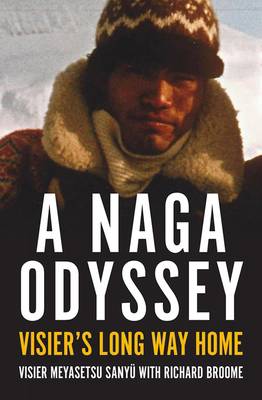
- Retrait gratuit dans votre magasin Club
- 7.000.000 titres dans notre catalogue
- Payer en toute sécurité
- Toujours un magasin près de chez vous
- Retrait gratuit dans votre magasin Club
- 7.000.000 titres dans notre catalogue
- Payer en toute sécurité
- Toujours un magasin près de chez vous
Description
Visier Meyasetsu Sanyu, his family and fellow villagers of Khonoma, fled for their lives to the jungles of Nagaland in 1956. He and his family survived privations and starvation for over two years, though many others did not. Visier emerged from the jungle aged eight into a turbulent world altered by Western influence, civil war and colonial oppression. He found refuge from war in Australia, where during two decades he faced the loss of home and tradition, and found healing and a second home. This powerful story tracks Visier's fascinating journey from indigenous religion to Christianity, from village school to a professorship, and from small town life to appearances before the United Nations. His kaleidoscopic sixty-year odyssey to find peace, tranquillity, and forgiveness for others, is vividly told against the rich tapestry of the Naga quest to be free. Visier Meyasetsu SanyÃ?Â?Ã?Â1/4 is an Elder of the Meyasetsu clan of the Angami tribe, Khonoma, Nagaland. He has a Batchelor of Theology, a PhD in History, and was the inaugural Head of the DepartÃ?Â?Ã?Â-ment of History and Archaeology at the University of Nagaland. He has addÃ?Â?Ã?Â-ressed many forums across the world, including the United NatÃ?Â?Ã?Â-ions. He is the current President of the Overseas Naga Association, an InterÃ?Â?Ã?Â-national Elder of Initiatives of Change, headÃ?Â?Ã?Â-quartered in Caux, SwitzÃ?Â?Ã?Â-erland, and is a Board member of the Melbourne Interfaith Centre. Richard Broome is Emeritus Professor of History at La Trobe University in Melbourne, Australia, and the author of twelve books, including three on Indigenous Australians, notably Aboriginal AusÃ?Â?Ã?Â-tralians 4th edition (2010). He is a Fellow of the Australian Academy of the Humanities, a Fellow and vice president of the Royal Historical Society of Victoria, Melbourne, and Patron of the History Teachers' Association of Victoria. (Series: Investigating Power) [Subject: Politics, Asian Studies, Religious Studies, Biography]
Spécifications
Parties prenantes
- Auteur(s) :
- Editeur:
Contenu
- Nombre de pages :
- 330
- Langue:
- Anglais
- Collection :
Caractéristiques
- EAN:
- 9781925495829
- Date de parution :
- 29-08-17
- Format:
- Livre broché
- Format numérique:
- Trade paperback (VS)
- Dimensions :
- 152 mm x 222 mm
- Poids :
- 367 g







